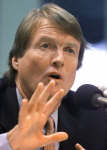Partner Channels: Auctions | Health | Home & Decor | Tech Education | Jobs | Matrimonial
February 13, 2002 | 1210 IST
|
|
|
|
|
|
||
|
Channels: Astrology | Contests | E-cards | Money | Movies | Romance | Search | Women Partner Channels: Auctions | Health | Home & Decor | Tech Education | Jobs | Matrimonial |
||
|
|
||
|
Home >
Money > Reuters > Report February 13, 2002 | 1210 IST |
Feedback
|
|
|
 Enron reduces board as part of reorganisationSix members of Enron Corp's board of directors, a panel blasted for its failed oversight of the energy giant, are exiting the firm as part of its accelerating reorganisation plan, the company said on Tuesday. Enron said in a regulatory filing that the resignations are effective in 30 days, which will leave eight members on the panel. In a Securities and Exchange Commission filing, Enron said that the six who are resigning include three of the company's longest-serving directors and three who must travel long distances to fulfill their governance obligations. But the most notable resignation is that of Robert Jaedicke, an accounting professor and former dean of Stanford University's Graduate School of Business who served on the board's embattled audit committee. Jaedicke testified before Congress on Thursday, and defended his role as the watchdog of Enron's finances. In addition, the bankrupt energy trading group said it believes that current shareholders will not receive any stake in the reorganised group because the liquidated, undisputed claims against the company exceed the fair market value of its operations and assets. "Consequently, Enron believes that its existing equity does not and will not have value and that any Chapter 11 plan of reorganisation confirmed by the Bankruptcy Court will not provide Enron's existing equity with any interest in the reorganised debtor," the company said in a statement. The decision signals that shareholders -- who are typically the last in line to recover anything under a Chapter 11 bankruptcy reorganisation -- will have civil lawsuits as their only means of recovering any value to their investments. Enron shares, which peaked at more than $90 in August 2000, closed on Tuesday at 33 cents in over-the-counter trade. "What this means is that shareholders who thought they were on the short end of the stick aren't even on the stick," said John Olson, an analyst with Houston investment bank Sanders Morris Harris. "There is going to be a real dogfight to get a good recovery. It is telegraphing a situation where even the subordinated creditors had better start scrambling," he said. As blame has spread since the Houston energy trader plummeted from the heights of Wall Street glory to the biggest Chapter 11 bankruptcy in US history, the board has come under heavy fire for its failure to keep sharp watch over Enron's finances and accounting. An internal report on Enron's now-infamous off-balance sheet partnerships said flatly that the board failed in its oversight duties. The directors and top Enron insiders are the target of massive shareholder lawsuit seeking damages for similar reasons. Joining Jaedicke in leaving are Hang Lung Chairman Ronnie Chan of Hong Kong, Lord John Wakeham of London and Paulo V Ferraz Pereira, the executive vice president of Brazil's Grupo Bozano. Longtime board members John Duncan and Charles Lemaistre, the former president of Houston's M D Anderson Cancer Center, are also stepping down. None of the board has escaped the intense scrutiny that Enron's stunning corporate collapse has brought down. The internal report, prepared by a special committee of Enron's board headed by University of Texas Law School Dean William Powers, took the full panel to task but absolved it in those instances where crucial information was withheld from its members. One member of the audit committee, Herbert Winokur, will remain on the board and will join a new committee overseeing Enron's reorganisation. He was a member of the special investigative committee that issued the internal report, but did not participate in the findings that related to his work on the board's audit panel. Winokur, Raymond Troubh and current board member Norman Blake will comprise the reorganisation panel, Enron said. The firm said it is also searching for a non-executive board chairman and other members to assist in the restructuring. Former Enron chairman and chief executive officer Ken Lay, who invoked his Constitutional right against self-incrimination in refusing to testify before Congress on Tuesday, left the board last week. He quit as Enron's top executive on January 23 under pressure from Enron's creditors, who moved to put turnaround ace Stephen Cooper in place as interim CEO. ALSO READ:
|
ADVERTISEMENT |
||||||